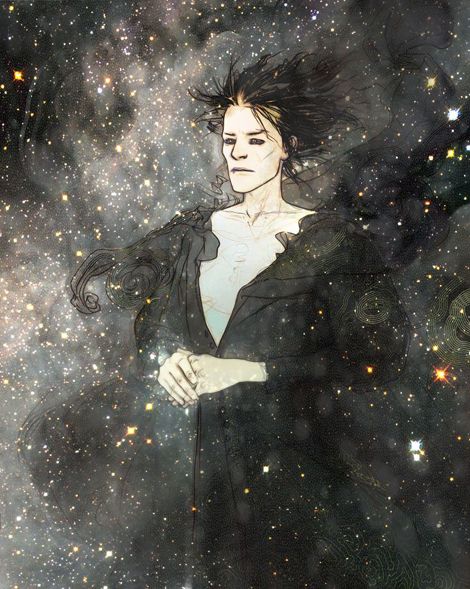In recent years, we’ve seen a boatload of comic books and graphic novels make their way to the silver screen, from Big Two stalwarts like Spider-Man and Batman to independent titles like Scott Pilgrim and 30 Days Of Night. Among the various adaptations, some creators have emerged as magnets for Hollywood types -- although in this case not specifically for his comic work: Neil Gaiman.
We know Gaiman best for his comics work, but it's arguably his prose work that made his name for the mainstream public-at-large and the Hollywood types that have hired him for jobs. While none of his comics work has been adapted to the screen, his prose and prose/art hybrids have come to life in the movies for Stardust and Coraline, and the BBC series Neverwhere. He's been brought in to write episodes of Doctor Who and Babylon 5, and has written original screenplays for movies like Beowulf, Mirrormask and several unreleased projects. Be that as it may, people have attempted film adaptations of his comics work in the past, including an adaptation of Death: The High Cost of Living several years back.
But with Gaiman's stock in people's minds continuing to ride high, I'd bet money on more of Gaiman's comic work making it to the screen. Here's a crib sheet for the Hollywood-types on what they should do and how they should do it. Take note, I chose to leave out the variety of prose work that would be natural fits for adaptation, even the prose work that's later been adapted to comics.
The Sandman: If there's one comic that Gaiman will always be remembered for, it's The Sandman. It's his defacto definitive work in the comics form (and arguably the written word), and rightly so. The story of a rebellious brother in a family of gods, the Sandman is the person in charge of the realm of dreams and all that comes with it. It provided a gateway into a world of different stories, and it's stoked many cinematic storytellers to try to bring it to the big screen. At one point, Quentin Tarantino's former writing/producing partner Roger Avary was attached to direct, and recently writer/director James Marigold (Walk The Line) was pitching it as an HBO series. The last news released was that DC's parent company had lined up Supernatural creator Eric Kripke to push it on the television front. Five years ago a TV series might seem preposterous, but with True Blood doing what it does, a Sandman serialized series is feasible.
Signal To Noise: One of Gaiman's earliest comics works, Signal To Noise follows a filmmaker trying to finish his final project before succumbing to a terminal illness. It's been adapted twice to other formats (radio and stage) but no film/television translation has ever been discussed. This could be a great cerebral drama that wouldn't need a big budget; take long-time Stephen King adapter Lawrence Kasdan in and this could be a great film.
Lady Justice: Not many people remember this, and those that do might have a bad taste in their mouth right now, but it's not Gaiman's fault. Lady Justice was one of several comic concepts Gaiman sold to a comics company called Tekno Comics that they developed with other writers. Peel that away, and there's still a strong concept there: a blindfolded woman holding scales takes physical form in a supernatural version of 100 Bullets, offering wronged women a chance to bring justice to their persecutors. This would work perfect as a serialized story, allowing standalone episodes while also sowing the seeds for a larger arc.
The Books of Magic: The success of the "other" story of a boy magician might skew The Books of Magic for some, but Gaiman's creation still remains a potent bed of creativity. DC's head honcho Diane Nelson has a history of shepherding J.K. Rowling's Harry Potter books to success; maybe she could do that same magic here.
Death: The High Cost Of Living: One of the most promising of Gaiman's ouvre, and also the one that came the closest to filming before falling through. For several years, Gaiman himself was shepherding a film adaptation based on his own script titled Death and Me. Guillermo del Toro was signed on as executive producer with Gaiman penciled in to direct, even going so far as to shadow del Toro for a week during the filming of Hellboy II: The Golden Army. It came on and off the backburner for years before Gaiman pronounced in dead in late 2010 due to intervention from DC and Warner Bros. When someone wises up, this could be a blockbuster film in the making -- perhaps even more popular than a Sandman film.




